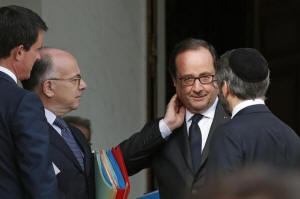|
France's Hollande meets religious leaders
amid row over attacks security
 Send a link to a friend
Send a link to a friend
 [July 27, 2016]
By Andrew Callus and Chine Labbé [July 27, 2016]
By Andrew Callus and Chine Labbé
PARIS (Reuters) - President Francois
Hollande displayed interfaith solidarity with France's religious leaders
on Wednesday after two Islamist militants killed a Roman Catholic priest
in a church, igniting fierce political criticism of the government's
security record.
One of the assailants was a known would-be jihadist awaiting trial under
supposedly tight surveillance, a revelation that raised pressure over
the Socialist government's response to a wave of attacks claimed by
Islamic State since early in 2015.
"We cannot allow ourselves to be dragged into the politics of Daech
(Islamic State), which wants to set the children of the same family
against each other," the Archbishop of Paris, Cardinal André
Vingt-Trois, told journalists after the meeting at the Elysee
presidential palace.
He was flanked by representatives of other Christian denominations as
well as Jewish, Muslim and Buddhist leaders.
Hollande and his ministers were already under fire from conservative
opponents over the policing of Bastille Day celebrations in the Riviera
city of Nice in which 84 people died when a delivery man drove a heavy
truck at revelers.
Former president Nicolas Sarkozy, who is expected to enter a
conservative primary for next year's presidential election, stepped up
his attack on Hollande's record since the first major attack against
satirical magazine Charlie Hebdo last year.
"All this violence and barbarism has paralyzed the French left since
January 2015," Sarkozy told Le Monde newspaper. "It has lost its
bearings and is clinging to a mindset that is out of touch with
reality."

Sarkozy has called for the detention or electronic tagging of all
suspected Islamist militants, even if they have committed no offense.
France's internal security service has confidential "S files" on some
10,500 suspected jihadists.
Interior Minister Bernard Cazeneuve rejected Sarkozy's proposal, saying
that to jail them would be unconstitutional and in any case could be
counterproductive.
"What has enabled France to break up a large number of terrorist
networks is keeping these people under 'S file' surveillance, which
allows intelligence services to work without these individuals being
aware," he said on Europe 1 radio.
The chairman of France's conference of religious faiths, Protestant
community leader Francois Clavairoly, said after the talks with Hollande
that it was impossible to protect every place of worship in the country.
"Everyone has to take responsibility, use best practice and keep an eye
open," he said.
DEATH AT THE ALTAR
Tuesday's attackers interrupted a church service, forced the 85-year-old
priest to his knees at the altar and slit his throat. As they came out
of the church hiding behind three hostages and shouting "Allahu akbar"
("God is Greatest"), they were shot and killed by police.
The knifemen arrived during morning mass in Saint-Etienne-du-Rouvray, a
working-class town near Rouen, northwest of Paris, where Father Jacques
Hamel had been celebrating mass. One of the hostages was badly wounded
during the attack.
Islamic State said on its news agency that its "soldiers" carried out
the attack. It has prioritised targeting France, which has been bombing
the group's bases in Iraq and Syria as part of a U.S.-led international
coalition.
[to top of second column] |

French President Francois Hollande (2ndR) speaks with France's Chief
Rabbi Haim Korsia (R), Interior Minister Bernard Cazeneuve (2ndL)
and Prime Minister Manuel Valls after a meeting with the French
President and representatives of religious communities at the Elysee
Palace in Paris, France, a day after a priest was killed with a
knife and another hostage seriously wounded in an attack on a church
in Saint-Etienne-du-Rouvray carried out by assailants linked to
Islamic State, July 27, 2016. REUTERS/Benoit Tessier

Police said they arrested a 16-year-old local youth after the
incident but Cazeneuve said on Wednesday he did not appear to be
linked to the church attack.
One of the attackers, 19-year-old Adel Kermiche, was a local man who
was known to intelligence services after his failed bids to reach
Syria to wage jihad.
Kermiche first tried to travel to Syria in March 2015 but was
arrested in Germany. Upon his return to France he was placed under
surveillance and barred from leaving his local area.
Less than two months later, Kermiche slipped away and was
intercepted in Turkey making his way toward Syria again.
He was sent back to France and detained until late March this year
when he was released on bail pending trial for alleged membership of
a terrorist organization. He had to wear an electronic tag,
surrender his passport and was only allowed to leave his parents'
home for a few hours a day.
Kermiche's tag did not send an alarm because the attack took place
during the four hour period when he was allowed out.
According to the justice ministry, there are just 13 terrorism
suspects and people convicted of terrorist links wearing such tags.
Seven are on pre-trial bail. The other six have been convicted but
wear the electronic bracelet instead of serving a full jail term.
France was already in a state of shock less than two weeks after the
Nice truck attack. In November, 130 people died in shooting and
suicide bombings in and around Paris.

In March, three Islamist militants linked to the Paris attackers
killed 32 people in suicide attacks on Brussels airport and a metro
station in the Belgian capital.
Since the Bastille Day killings in Nice, there has been a spate of
attacks in Germany too.
(This version of the story corrects paragraph eight to show all
10,500 are under surveillance as suspected jihadis)
(Reporting by Andrew Callus and Chine Labbe; Editing by Paul Taylor)
[© 2016 Thomson Reuters. All rights
reserved.]
Copyright 2016 Reuters. All rights reserved. This material may not be published,
broadcast, rewritten or redistributed. |